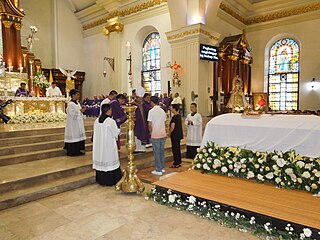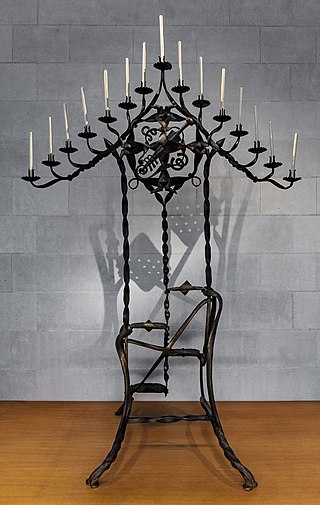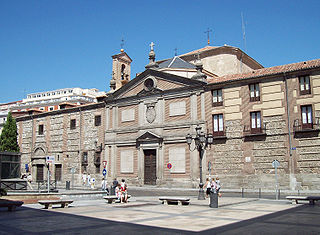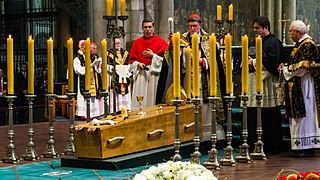Related Research Articles

A Requiem or Requiem Mass, also known as Mass for the dead or Mass of the dead, is a Mass of the Catholic Church offered for the repose of the soul or souls of one or more deceased persons, using a particular form of the Roman Missal. It is usually celebrated in the context of a funeral.

In the practice of Christianity, canonical hours mark the divisions of the day in terms of fixed times of prayer at regular intervals. A book of hours, chiefly a breviary, normally contains a version of, or selection from, such prayers.
Libera may refer to:
John Sheppard was an English composer of the Renaissance.

Matins is a canonical hour in Christian liturgy, originally sung during the darkness of early morning.

Psalm 51, one of the penitential psalms, is the 51st psalm of the Book of Psalms, beginning in English in the King James Version: "Have mercy upon me, O God". In the slightly different numbering system used in the Greek Septuagint and Latin Vulgate translations of the Bible, this psalm is Psalm 50. In Latin, it is known as Miserere, in Ancient Greek: Ἥ Ἐλεήμων, romanized: Hḗ Eleḗmōn), especially in musical settings. The introduction in the text says that it was composed by David as a confession to God after he sinned with Bathsheba.

Tenebrae is a religious service of Western Christianity held during the three days preceding Easter Day, and characterized by gradual extinguishing of candles, and by a "strepitus" or "loud noise" taking place in total darkness near the end of the service.

O magnum mysterium is a responsorial chant from the Matins of Christmas.

The Office of the Dead or Office for the Dead is a prayer cycle of the Canonical Hours in the Catholic Church, Anglican Church and Lutheran Church, said for the repose of the soul of a decedent. It is the proper reading on All Souls' Day for all departed souls (Purgatory), and can be a votive office on other days when said for a particular decedent. The work is composed of different psalms, scripture, prayers and other parts, divided into The Office of Readings, Lauds, Daytime Prayer, Vespers and Compline.

Officium Defunctorum is a musical setting of the Office of the Dead composed by the Spanish Renaissance composer Tomás Luis de Victoria in 1603. The texts have also been set by other composers including Morales.

An antiphonary or antiphonal is one of the liturgical books intended for use in choro, and originally characterized, as its name implies, by the assignment to it principally of the antiphons used in various parts of the Latin liturgical rites.
A responsory or respond is a type of chant in western Christian liturgies.

"Rorate caeli" or "Rorate coeli" are the opening words of Isaiah 45:8 in the Vulgate. The text appears at several points in the Christian liturgy of the Western Church during Advent.

The liturgical books of the Roman Rite are the official books containing the words to be recited and the actions to be performed in the celebration of Catholic liturgy as done in Rome. The Roman Rite of the Latin or Western Church of the Catholic Church is the most widely celebrated of the scores of Catholic liturgical rites. The titles of some of these books contain the adjective "Roman", e.g. the "Roman Missal", to distinguish them from the liturgical books for the other rites of the Church.

Absolution of the dead is a prayer for or a declaration of absolution of a dead person's sins that takes place at the person's religious funeral.
Libera me /Libera me, Domine is a Roman Catholic responsory that is sung in the Office of the Dead and at the absolution of the dead.
Christus factus est is taken from Saint Paul's Epistle to the Philippians. It is a gradual in the Catholic liturgy of the Mass. In pre-Vatican II Roman Rite practice, it was sung as the gradual at Mass on Maundy Thursday, however since the promulgation of the post-Vatican II Mass by Pope Paul VI in 1969 it has been employed instead as the gradual on Palm Sunday. Up until 1970 it was also sung daily at the conclusion of Tenebrae on the last days of Holy Week. It appeared first at Tenebrae of Maundy Thursday, but was not recited in full, ending with "...usque ad mortem". The following day at Tenebrae of Good Friday it was sung from the beginning until "...mortem autem crucis" and at Tenebrae of Holy Saturday it was sung in full. Up until the reform of the Holy Week liturgy promulgated by Pius XII in 1955 these Tenebrae services were sung in the late afternoon and evening of the previous day, and were well attended by the laity. Thus Tenebrae of Maundy Thursday was sung during the evening of Spy Wednesday; Tenebrae of Good Friday in the evening Maundy Thursday etc. For this reason Christus factus est was set by many composers of church music. From 1956 through 1969, and in the liturgical books of 1962 which are currently in use as the extraordinary form of the Roman Rite, these services have been place back in early mornings of the last three days of Holy Week, with the effect that complex musical settings of this text are rarely heard in their liturgical context.
Quatre motets pour un temps de pénitence, FP 97, are four sacred motets composed by Francis Poulenc in 1938–39. He wrote them on Latin texts for penitence, scored for four unaccompanied voices.
Tenebrae responsories are the responsories sung following the lessons of Tenebrae, the Matins services of the last three days of Holy Week: Maundy Thursday, Good Friday and Holy Saturday. Polyphonic settings to replace plainchant have been published under a various titles, including Responsoria pro hebdomada sancta.

The Responsories by the German composer Max Reger are 20 short settings of mostly biblical texts in English, to be used as responsories in Lutheran church services. Composed in 1911, they were first published in Philadelphia in 1914 as The Responsories.
References
- ↑ Breviarium Benedictinum (in Latin). Vol. 4. 1725. p. 425.
- 1 2
 One or more of the preceding sentences incorporates text from a publication now in the public domain : Adrian Fortescue (1913). "Libera Me". In Herbermann, Charles (ed.). Catholic Encyclopedia . New York: Robert Appleton Company.
One or more of the preceding sentences incorporates text from a publication now in the public domain : Adrian Fortescue (1913). "Libera Me". In Herbermann, Charles (ed.). Catholic Encyclopedia . New York: Robert Appleton Company.